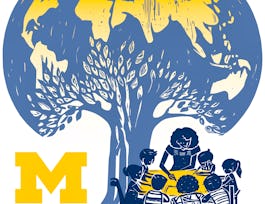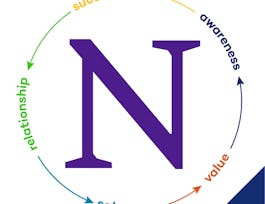For three decades and longer we have heard educators and technologists making a case for the transformative power of technology in learning. However, despite the rhetoric, in many ways and at most institutional sites, education is still relatively untouched by technology. Even when technologies are introduced, the changes sometimes seem insignificant and the results seem disappointing. If the print textbook is replaced by an e-book, do the social relations of knowledge and learning necessarily change at all or for the better? If the pen-and-paper test is mechanized, does this change the nature of our assessment systems? Technology, in other words, need not necessarily bring significant change. Technology might not even represent a step forward in education.


e-Learning Ecologies: Innovative Approaches to Teaching and Learning for the Digital Age
Taught in English
Some content may not be translated
47,011 already enrolled
(1,347 reviews)
Details to know

Add to your LinkedIn profile
1 quiz
See how employees at top companies are mastering in-demand skills


Earn a career certificate
Add this credential to your LinkedIn profile, resume, or CV
Share it on social media and in your performance review

There are 4 modules in this course
We begin this module with an introduction to the idea of an "e-learning ecology" and the notion of "affordance." We use this idea to map the range of innovative activities that we may be able to use in e-learning environments – not that we necessarily do. Many e-learning environments simply reproduce the worst of old, didactic pedagogies. We then go on to explore the notion of "ubiquitous learning," the first of seven "affordances" in computer-mediated educational applications and environments that we examine in this course.
What's included
9 videos9 readings1 quiz1 peer review2 discussion prompts1 plugin
This module examines two more e-learning affordances: "active knowledge making," or the right and responsibility of learners to take a degree of control over their own knowledge making; and "multimodal meaning-making," or the tools learners now have at hand to support their thinking and to represent the knowledge they have gained – including, for instance, text, image, diagram, animation, simulation, dataset, video, audio, or embedded web media.
What's included
6 videos2 readings2 peer reviews2 discussion prompts
Two further e-learning affordances are explored in this module: "recursive feedback," or the rapid and repeatable cycles of feedback or formative assessment now available, including machine feedback and machine-mediated human feedback; and the "collaborative intelligence" fostered by the very social nature of Web 2.0 and contemporary e-learning environments.
What's included
9 videos2 readings2 peer reviews2 discussion prompts
We come now to the last two of our seven e-learning affordances: "metacognition," or the process of thinking about thinking – a second order, more abstract, theoretical, and generalizable way of thinking; and "differentiated learning," addressing learners' different needs and interests. Together, these seven affordances become a tool with which to evaluate the scope of an e-learning technology and its application.
What's included
4 videos2 readings5 peer reviews2 discussion prompts1 plugin
Instructors

Recommended if you're interested in Education

University of Illinois at Urbana-Champaign

University of Illinois at Urbana-Champaign

University of Michigan

Northwestern University
Why people choose Coursera for their career




Learner reviews
Showing 3 of 1347
1,347 reviews
- 5 stars
86.23%
- 4 stars
10.54%
- 3 stars
1.97%
- 2 stars
0.29%
- 1 star
0.95%

Open new doors with Coursera Plus
Unlimited access to 7,000+ world-class courses, hands-on projects, and job-ready certificate programs - all included in your subscription
Advance your career with an online degree
Earn a degree from world-class universities - 100% online
Join over 3,400 global companies that choose Coursera for Business
Upskill your employees to excel in the digital economy
Frequently asked questions
Access to lectures and assignments depends on your type of enrollment. If you take a course in audit mode, you will be able to see most course materials for free. To access graded assignments and to earn a Certificate, you will need to purchase the Certificate experience, during or after your audit. If you don't see the audit option:
The course may not offer an audit option. You can try a Free Trial instead, or apply for Financial Aid.
The course may offer 'Full Course, No Certificate' instead. This option lets you see all course materials, submit required assessments, and get a final grade. This also means that you will not be able to purchase a Certificate experience.
When you purchase a Certificate you get access to all course materials, including graded assignments. Upon completing the course, your electronic Certificate will be added to your Accomplishments page - from there, you can print your Certificate or add it to your LinkedIn profile. If you only want to read and view the course content, you can audit the course for free.
You will be eligible for a full refund until two weeks after your payment date, or (for courses that have just launched) until two weeks after the first session of the course begins, whichever is later. You cannot receive a refund once you’ve earned a Course Certificate, even if you complete the course within the two-week refund period. See our full refund policy.



